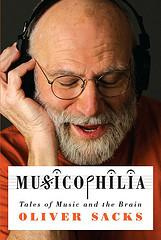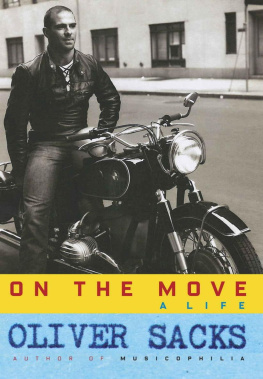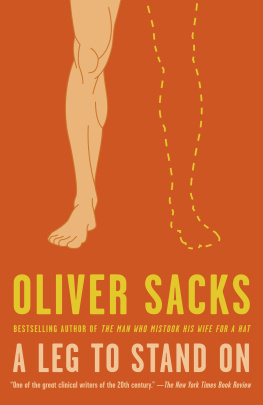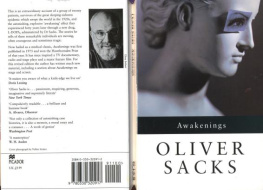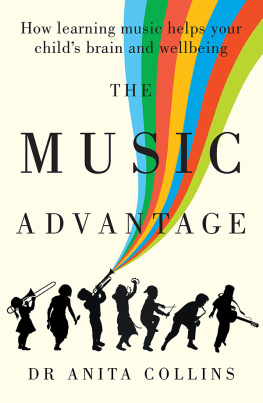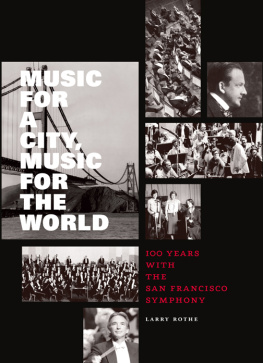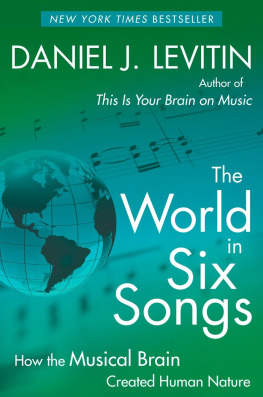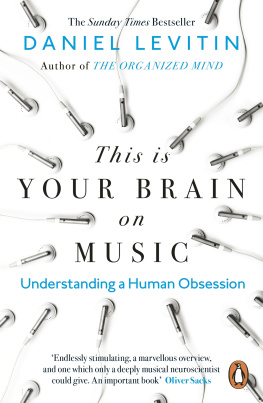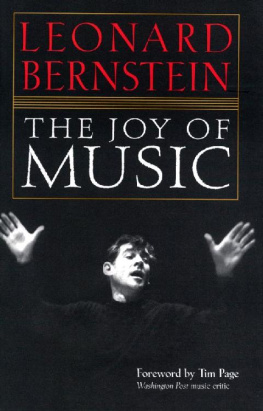Musicophilia
Tales of Music and the Brain
Oliver Sacks
Alfred A. Knopf
New York Toronto
2007
For Orrin Devinsky,
Ralph Siegel,
and Connie Tomaino
Preface
W hat an odd thing it is to see an entire species billions of people playing with, listening to, meaningless tonal patterns, occupied and preoccupied for much of their time by what they call music. This, at least, was one of the things about human beings that puzzled the highly cerebral alien beings, the Overlords, in Arthur C. Clarkes novel Childhoods End . Curiosity brings them down to the Earths surface to attend a concert, they listen politely, and at the end, congratulate the composer on his great ingenuity while still finding the entire business unintelligible. They cannot think what goes on in human beings when they make or listen to music, because nothing goes on with them . They themselves, as a species, lack music.
We may imagine the Overlords ruminating further, back in their spaceships. This thing called music, they would have to concede, is in some way efficacious to humans, central to human life. Yet it has no concepts, makes no propositions; it lacks images, symbols, the stuff of language. It has no power of representation. It has no necessary relation to the world.
There are rare humans who, like the Overlords, may lack the neural apparatus for appreciating tones or melodies. But for virtually all of us, music has great power, whether or not we seek it out or think of ourselves as particularly musical. This propensity to music shows itself in infancy, is manifest and central in every culture, and probably goes back to the very beginnings of our species. Such musicophilia is a given in human nature. It may be developed or shaped by the cultures we live in, by the circumstances of life, or by the particular gifts or weaknesses we have as individuals but it lies so deep in human nature that one must think of it as innate, much as E. O. Wilson regards biophilia, our feeling for living things. (Perhaps musicophilia is a form of biophilia, since music itself feels almost like a living thing.)
Given the obvious similarities between music and language, it is not surprising that there has been a running debate for more than two hundred years as to whether they evolved in tandem or independently and, if the latter, which came first. Darwin speculated that musical tones and rhythms were used by our half-human ancestors, during the season of courtship, when animals of all kinds are excited not only by love, but by strong passions of jealousy, rivalry, and triumph and that speech arose, secondarily, from this primal music. His contemporary Herbert Spencer held the opposite view, conceiving that music arose from the cadences of emotional speech. Rousseau, a composer no less than a writer, felt that both had emerged together, as a singsong speech, and only later diverged. William James saw music as an accidental genesisa pure incident of having a hearing organ. Steven Pinker, in our own time, has expressed himself even more forcibly: What benefit could there be [he asks, echoing the Overlords] to diverting time and energy to making plinking noises?As far as biological cause and effect are concerned, music is useless. It could vanish from our species and the rest of our lifestyle would be virtually unchanged. There is, nonetheless, much evidence that humans have a music instinct no less than a language instinct, however this evolved.
We humans are a musical species no less than a linguistic one. This takes many different forms. All of us (with very few exceptions) can perceive music, perceive tones, timbre, pitch intervals, melodic contours, harmony, and (perhaps most elementally) rhythm. We integrate all of these and construct music in our minds using many different parts of the brain. And to this largely unconscious structural appreciation of music is added an often intense and profound emotional reaction to music. The inexpressible depth of music, Schopenhauer wrote, so easy to understand and yet so inexplicable, is due to the fact that it reproduces all the emotions of our innermost being, but entirely without reality and remote from its pain. Music expresses only the quintessence of life and of its events, never these themselves.
Listening to music is not just auditory and emotional, it is motoric as well: We listen to music with our muscles, as Nietzsche wrote. We keep time to music, involuntarily, even if we are not consciously attending to it, and our faces and postures mirror the narrative of the melody, and the thoughts and feelings it provokes.
Much that occurs during the perception of music can also occur when music is played in the mind. The imagining of music, even in relatively nonmusical people, tends to be remarkably faithful not only to the tune and feeling of the original but to its pitch and tempo. Underlying this is the extraordinary tenacity of musical memory, so that much of what is heard during ones early years may be engraved on the brain for the rest of ones life. Our auditory systems, our nervous systems, are indeed exquisitely tuned for music. How much this is due to the intrinsic characteristics of music itself its complex sonic patterns woven in time, its logic, its momentum, its unbreakable sequences, its insistent rhythms and repetitions, the mysterious way in which it embodies emotion and will and how much to special resonances, synchronizations, oscillations, mutual excitations, or feedbacks in the immensely complex, multi-level neural circuitry that underlies musical perception and replay, we do not yet know.
But this wonderful machinery perhaps because it is so complex and highly developed is vulnerable to various distortions, excesses, and breakdowns. The power to perceive (or imagine) music may be impaired with some brain lesions; there are many such forms of amusia. On the other hand, musical imagery may become excessive and uncontrollable, leading to incessant repetition of catchy tunes, or even musical hallucinations. In some people, music can provoke seizures. There are special neurological hazards, disorders of skill, that may affect professional musicians. The normal association of intellectual and emotional may break down in some circumstances, so that one may perceive music accurately, but remain indifferent and unmoved by it or, conversely, be passionately moved, despite being unable to make any sense of what one is hearing. Some people a surprisingly large number see color or taste or smell or feel various sensations as they listen to music though such synesthesia may be accounted a gift more than a symptom.
William James referred to our susceptibility to music, and while music can affect all of us calm us, animate us, comfort us, thrill us, or serve to organize and synchronize us at work or play it may be especially powerful and have great therapeutic potential for patients with a variety of neurological conditions. Such people may respond powerfully and specifically to music (and, sometimes, to little else). Some of these patients have widespread cortical problems, whether from strokes or Alzheimers or other causes of dementia; others have specific cortical syndromes loss of language or movement functions, amnesias, or frontal-lobe syndromes. Some are retarded, some autistic; others have subcortical syndromes such as parkinsonism or other movement disorders. All of these conditions and many others can potentially respond to music and music therapy.
* * *
F OR ME, the first incitement to think and write about music came in 1966, when I saw the profound effects of music on the deeply parkinsonian patients I later wrote about in Awakenings. And since then, in more ways than I could possibly imagine, I have found music continually forcing itself on my attention, showing me its effects on almost every aspect of brain function and life.

